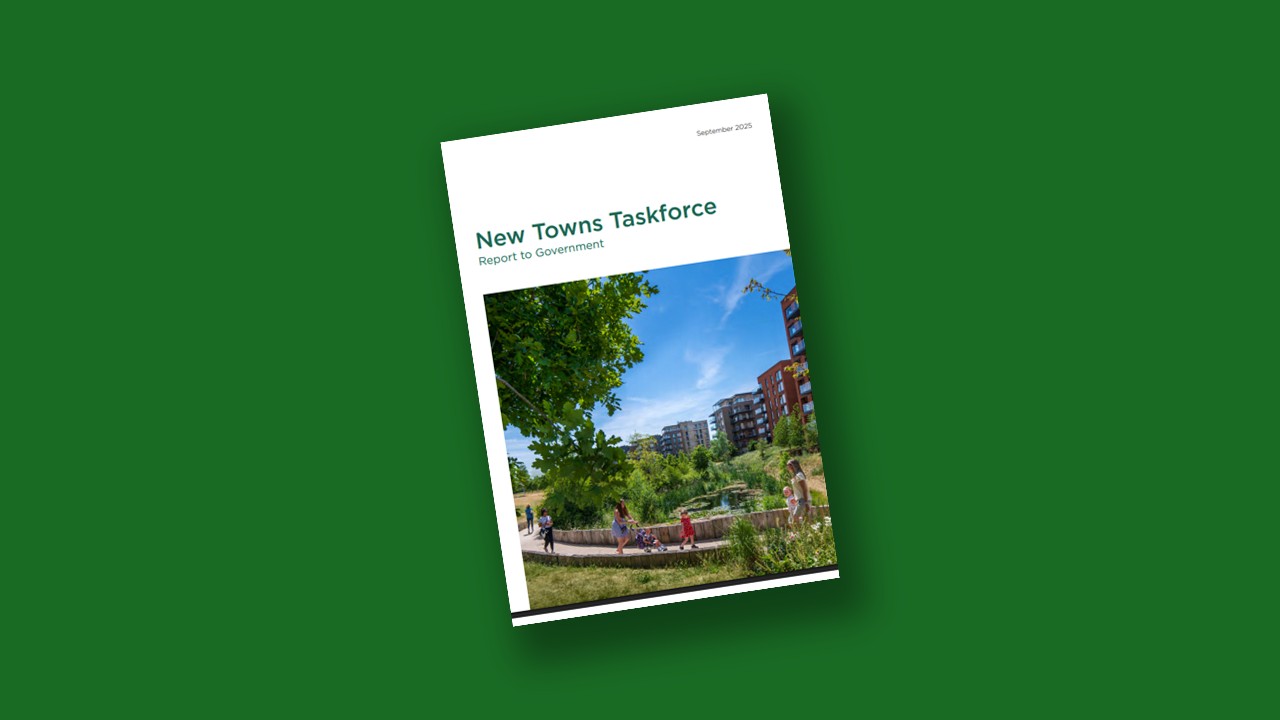
The Good Homes Alliance welcomes the New Towns Taskforce Report to Government, and if strengthened a number of the 44 key recommendations could help make New Towns sustainable, healthy, and community-focused.
It is encouraging to see placemaking given such prominence in the recommendations, with clear principles at the heart of any new town proposal, as set out in recommendation 3[i]. Placemaking is a ; we strongly support the development of neighbourhoods that offer outstanding liveability and accessibility, as highlighted in recommendation 5[ii]. These values must remain a priority and not be diluted as the process progresses.
The GHA welcomes recommendation 6[iii], which calls for a variety of housing types tailored to community needs, including a minimum of 40% affordable homes, with at least half designated for social rent, although there is room for this to go further.
Evidence shows that walkability, local transport, and access to services, amenities, and green spaces contribute to healthier, happier communities. Recommendations 7[iv], 8[v], and 9[vi] highlight these as key elements for new towns, and keeping these as core principles will certainly increase success for the new towns.
The GHA advocates for sustainable, healthy, and well-designed homes, and alongside biodiversity, and climate resilience should be fundamental to every new housing development in the UK. Recommendation 9 supports this, urging the government to establish a clear framework, an essential step for the successful implementation of climate strategies in new towns. It is reassuring that the stakeholder group encompasses a range of organisations active in this field. We encourage the government to include further organisations at the forefront of sustainable and healthy house building, including the Good Homes Alliance.
Whilst the report references ‘low carbon’ throughout, further robustness should be put in place for new towns to achieve net zero, and look to policy exemplars where this is already successfully being achieved, for example Cornwall, Central Lincolnshire, and Bath & North East Somerset. And whilst the new towns will need to comply with the new Future Homes Standard, we recommend that more ambitious policy be put in place with Energy Use Intensity (EUI) based targets with the potential to both create net zero homes and reduce bills for residents.
Although it is mentioned that there could be targets for energy performance of buildings, renewable energy generation, as well as water supply, waste management, use of district heating and cooling systems, biodiversity and ways of dealing with flood risks, the report does not recommend what these should be. More should be done to make sure the highest targets are put in place. There is currently a DEFRA led consultation out for the review of Part G, which includes water efficiency. The GHA will be hosting a workshop of members on this soon and submitting a formal response. Drawing on our recent Water Efficiency and Reuse in Housing Design Guide.
The report does mention that particular consideration should be given to summer overheating. With a warming climate this is becoming increasingly relevant and more than half of UK homes, 15.7 million, fail to meet the bedroom overheating criteria, which can cause serious risks to health. There are tools available that should be embedded into design guides, for example the GHA Overheating in New Homes Tool and Guidance.
Recommendation 18[vii] could allow local authorities to make meaningful contributions to new towns, drawing on local expertise, and our own has demonstrated a willingness to exceed minimum sustainability requirements. Allowing such ambition could set new towns apart as exemplary projects.
While we support a robust framework for sustainable development, it is important that any review of legislation aimed at accelerating delivery does not diminish sustainability standards or build quality. Protecting the many positive recommendations outlined in this report is vital for the long-term success and longevity of the new towns.
Financing will play a crucial role in the development of new towns, but we urge the government to adopt the highest standards, prioritising people over profit from the offset. As the report notes, private investment and engagement with major house-builders will be necessary for delivery, but these must not compromise core principles of sustainability and community benefit.
The Good Homes Alliance produces practical guidance to support climate resilient, sustainable homes, and will follow the development of the New Towns and welcomes involvement to promote high standards and healthy, sustainable homes for all.
[i] Recommendation 3: We recommend that the government sets out clear placemaking principles to form the basis of any new town masterplan, statutory plan and subsequent development proposals.
[ii] Recommendation 5: New towns should aim to be built at a density sufficient to enable residents to walk to local amenities, support public transport, unlock better social infrastructure, and create active and liveable neighbourhoods, with government establishing clear minimum density thresholds.
[iii] Recommendation 6: New towns should provide a diverse range of high-quality housing, with a range of housing types and tenures to suit the needs of a balanced community. This should include a minimum target of 40% affordable housing, of which at least half to be available for social rent.
[iv] Recommendation 7: New towns should support thriving communities by ensuring access to schools, cultural, sporting and healthcare facilities, and other social infrastructure that meets new residents’ needs from the outset.
[v] Recommendation 8: New towns should be healthy and safe places which promote active lives for residents, with easily accessible green spaces and recreational facilities.
[vi] Recommendation 9: New towns should be designed and delivered to embrace environmental principles, with buildings and neighbourhoods that are low carbon, climate resilient and which help to protect, restore and enhance biodiversity.
[vii] Recommendation 18: Where local or combined authorities have a strong recent track record of housing delivery or have robust plans to develop capability to deliver on the scale required, they should play an enhanced role in delivery of new towns.
A full annex of the recommendations is available on page 114 of the report.
